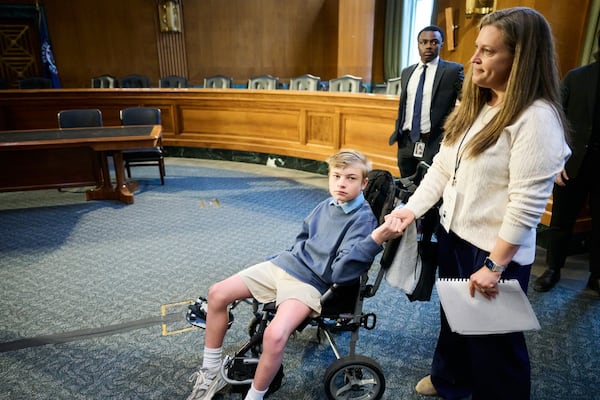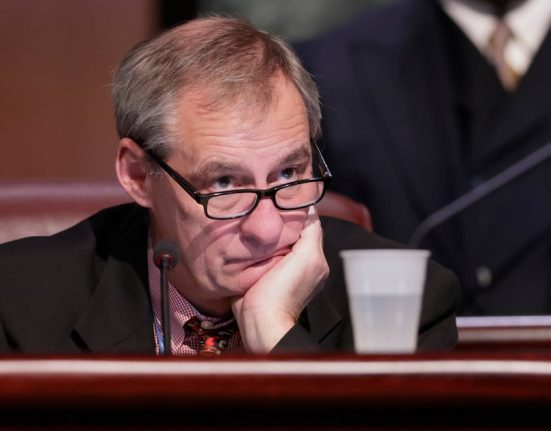Stetson was diagnosed with Angelman syndrome a couple months later, when the results of genetic blood work revealed that he had a deleted gene on the maternally derived Chromosome 15. The neurogenetic disorder occurs in about one in 15,000 births and affects around 500,000 people worldwide.
“I think we were both in shock. We had never heard of it,” Kathryn Ely said. “It was extremely rare and there was no specialist in Atlanta, which was kind of mind-blowing to us given Emory, the Marcus Autism Center, Children’s (Hospital), Scottish Rite and all of that.
“No one in Atlanta had any kind of real, true understanding of AS.”
Stetson is one of 87 Georgians diagnosed with AS, according to the Angelman Syndrome Foundation database. He has difficulty with speech and balance.
Kathryn and Matt scheduled an initial appointment with Dr. Charles Williams at the University of Florida in Gainesville, a doctor who worked alongside Dr. Harry Angelman, the physician who first identified AS characteristics in 1965.
“There was a lot of grieving, but then it was understanding that nothing about Stetson was different than the day before his diagnosis,” Kathryn said. “He was still the same wonderful, full of life, always happy, 17-month-old baby boy that he was before. I think that, coupled with starting to really gain knowledge about AS, made us feel more empowered than lost.”
A turn toward advocacy
After Stetson’s diagnosis, Kathryn turned her efforts from teaching toward advocacy, joining the AS foundation as a volunteer.
Matt, a football coach at Cherokee High School, came up with the idea of hosting a charity golf tournament, and the “Stetson’s Chip Away at AS” event was born. The 10th annual tournament will be held Friday in Canton.
Kathryn and Matt also hosted walks to raise AS awareness in metro Atlanta.
Now, Kathryn works as the foundation’s family resource director, facilitating community support programs and helping communicate with newly diagnosed families. In March, she traveled to Washington, D.C., for AS Congressional Advocacy Day, testifying and participating in a “coffee with constituents” event with U.S. Sen. Jon Ossoff, to try to protect Medicaid and medical research funding at the federal level.
“We just wanted to make sure that we were heard,” Kathryn Ely said.
Credit: Provided
Credit: Provided
Kathryn said that recent reductions in funding at the National Institutes of Health (NIH) have impacted the availability of funds for AS research.
“There was a lot of anxiety about all the hard work that we had done to raise money over the last 10 years. What was going to come of that?” Kathryn said.
Dr. Rebecca Burdine, professor of molecular biology at Princeton University whose daughter has AS, currently serves on the board of directors and as the Chair of the Science Advisory Committee for the foundation. Burdine said some scientific grants that have already been approved by the NIH are now caught in limbo.
“The news makes it sound like there’s all this money at the NIH and it’s being spent poorly,” Burdine said. “The truth is the NIH spends its money very, very well, and we haven’t had enough for decades.
“We’re managing to get by and accomplish some great things in human health, but it’s amazing to think about how much more we could accomplish and how much further we could be if we had been adequately funded for the past four years.”
There is still hope for a cure.
Scientists have already reversed AS in mice and are currently looking into viral treatments that could turn the missing gene back on in human neurons. However, with less federal funding, and without donations to rare disease organizations, continued research efforts could be stalled.
For families, that anxiety is compounded by concerns over the future of Medicaid and potential income limits that could make obtaining medication and therapies difficult.
“For everybody they think might be fraudulently using Medicaid,” Burdine said, “there are kids like ours who desperately need it.”
Kathryn said the golf tournament typically raises about $25,000 every year. She said this year’s event will be more important than ever, considering the cuts to grant funding.
She said a portion of the funds will be used for music therapy scholarships through Therabeat Inc., an intervention that is not covered by insurance but can be helpful for individuals living with AS.
“Now, we realize you can’t live in that state of constant anxiety and wonder and second-guessing,” Kathryn said, adding that part of her advocacy is informing people how harmful the funding cuts are “not just families like ours, but really everyone that they meet, from any kind of a diagnosis.”



